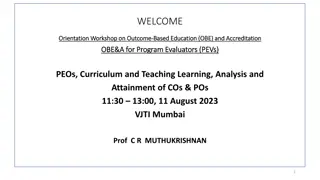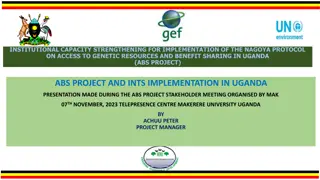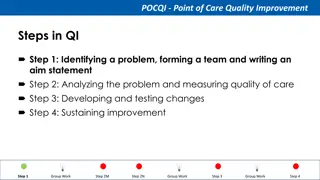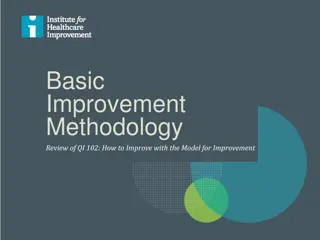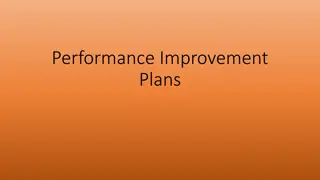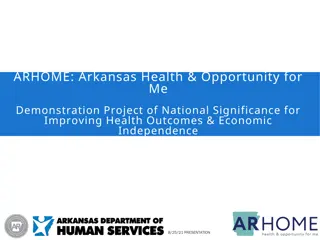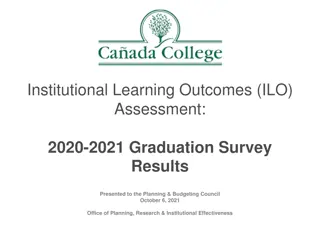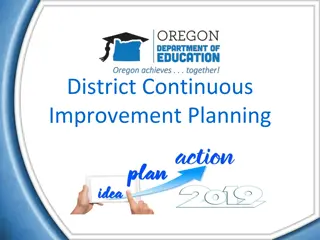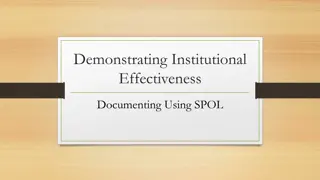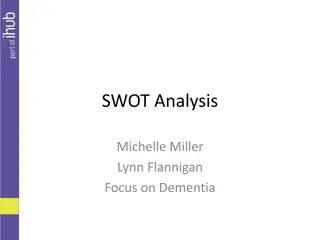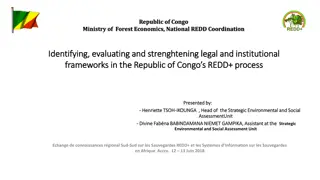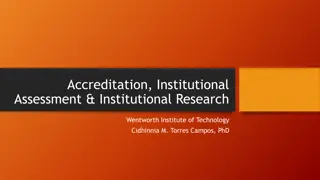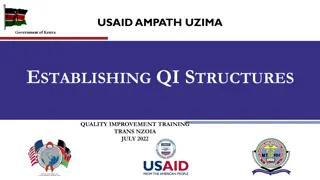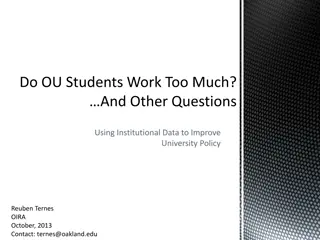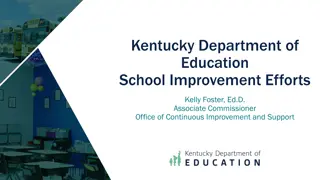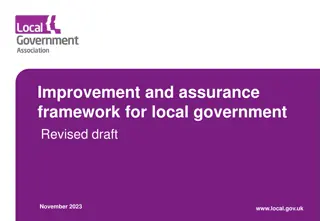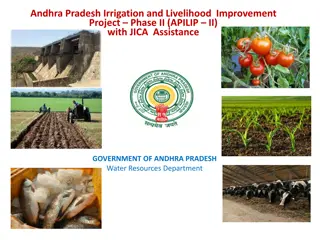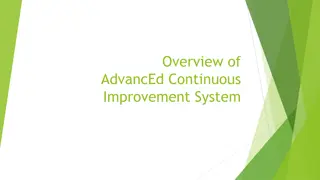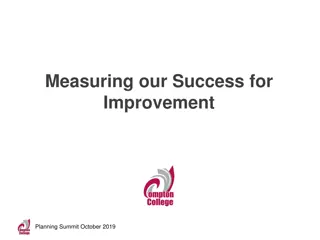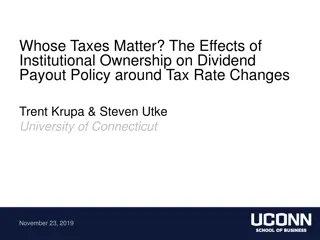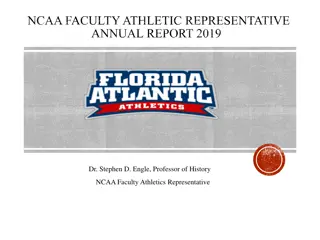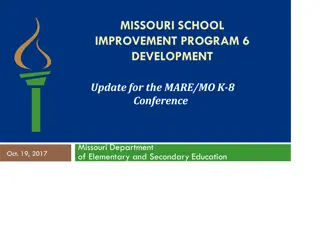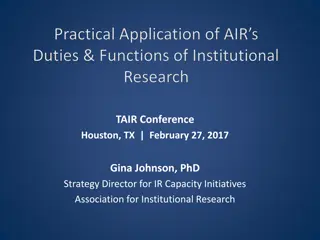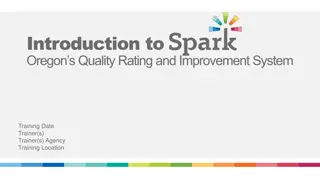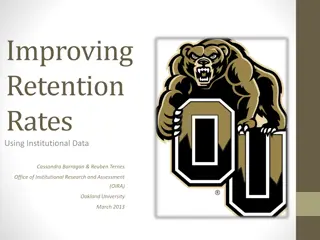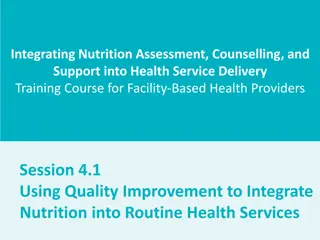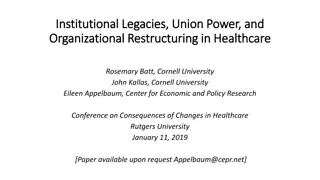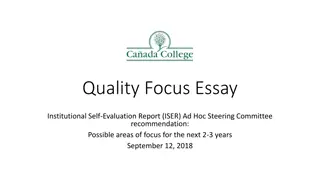INSTITUTIONAL GOVERNANCE FRAMEWORK
Currently, there is a lack of formal structure in the Institutional Housing Governance Framework (IHGF) within the public service system, leading to inefficiencies in managing institutional housing policies. This absence has resulted in deteriorating state assets, unmet housing demands, and ineffect
0 views • 17 slides
Integrated Improvement Plan 2023-2024
The Integrated Improvement Plan 2023-2024 focuses on establishing stable leadership and governance structures, enhancing communication and engagement efforts, and implementing quality improvement methodologies. Key milestones include filling substantive executive leadership positions, developing gov
0 views • 13 slides
Resource Allocation Review Webinar: Enhancing School Improvement Practices
Delve into the essential aspects of Resource Allocation Reviews in the educational setting through this webinar provided by the Office of School and District Improvement. Gain insights on the requirements, tools, and significance of conducting Resource Allocation Reviews to enhance school improvemen
0 views • 25 slides
Understanding Outcome-Based Education (OBE) and Accreditation for Program Evaluators Workshop
Explore the framework of OBE and accreditation, focusing on defining program outcomes, assessing outcomes, and continuous improvement through evaluation guidelines and reports. Learn about quality improvement in education through curriculum design and attainment analysis. Discover how to measure stu
4 views • 115 slides
Strengthening Institutional Capacity for Nagoya Protocol Implementation in Uganda
Uganda, known for its exceptional biodiversity and diverse indigenous ethnic groups, faces challenges of biodiversity decline and disappearing traditional knowledge associated with genetic resources. The Nagoya Protocol on Access to Genetic Resources and Benefit Sharing (ABS) presents an opportunity
0 views • 17 slides
Point of Care Quality Improvement (POCQI) Steps in Quality Improvement
POCQI involves four key steps: identifying a problem, analyzing the problem, developing and testing changes, and sustaining improvement. It emphasizes reviewing data, prioritizing problems, forming effective teams, and writing clear aim statements. Teamwork is crucial for healthcare improvement as i
0 views • 62 slides
Improving Quality with the Model for Improvement
In this content, we delve into the Model for Improvement methodology, focusing on key aspects such as setting aims, choosing measures, developing and testing changes. It discusses the three questions in the Model, elements of an effective aim statement, types of measures, and utilizing change concep
1 views • 27 slides
Utility Performance Improvement Strategies
Effective utility performance improvement involves benchmarking, selecting key performance indicators (KPIs) aligned with strategy, developing improvement plans, and implementing initiatives to achieve targets. This process entails identifying focus areas, setting improvement targets, and implementi
0 views • 37 slides
Maximizing Institutional Impact through ACE Centers of Excellence
ACE Impact Centers of Excellence benefit from strong institutional support and are crucial for catalyzing broader teaching and research excellence. The DLI.7 framework outlines various elements that support global best practices in Higher Education, emphasizing the importance of institutional owners
0 views • 17 slides
ARHOME: Arkansas Health & Opportunity for Me Demonstration Project
The ARHOME project in Arkansas aims to improve health outcomes and economic independence by transitioning Medicaid recipients to private insurance while maintaining eligibility and federal funding. With measurable goals focused on health improvement and poverty reduction, ARHOME seeks to drive quali
0 views • 16 slides
Cañada College 2021 Graduation Survey Results and ILO Assessment Presentation
Cañada College conducted its Institutional Learning Outcomes (ILO) assessment using various means including surveys and ePortfolios to ensure institutional effectiveness. The existing ILOs focus on critical thinking, creativity, communication, community understanding, and quantitative reasoning. Th
0 views • 41 slides
Oregon District Continuous Improvement Planning Process
Explore the key components of Oregon's district continuous improvement planning process, including objectives, executive memos, ODE commitments, and the essential elements that all Oregon districts must incorporate into their continuous improvement plans. Learn about the shifts in the overarching vi
0 views • 9 slides
Understanding Institutional Effectiveness in Education
Explore the concept of institutional effectiveness, focusing on assessing outcomes and continuous improvement within educational institutions. Learn about SACSCOC Standard 3.3.1, key definitions, and the importance of aligning goals with mission statements for impactful results.
0 views • 21 slides
Institutional Arrangement for GRP Compilation: Challenges and Solutions
The content discusses the institutional arrangement for compiling Gross Regional Products (GRPs) by either regional statistical offices or National Statistical Offices (NSO). It highlights the pros and cons of both approaches, focusing on factors like regional demand, fiscal constraints, data accura
0 views • 5 slides
Exploring Civic Virtue and Institutional Design in Early Modern Governance
Delve into the complexities of civic virtue and institutional design in early modern governance through a 3,000-word essay. Analyze the necessity of civic virtue within the state and consider contrasting perspectives on whether institutional design can replace it. Use primary texts to support your a
0 views • 32 slides
Impact of UN Guidelines on Foster Care and Institutional Care of Young Children in Europe and Central Asia
Professor Kevin Browne and Dr. Shihning Chou conducted a study on the impact of UN guidelines on foster care and institutional care of young children in Europe and Central Asia. The research highlights the physical harm and neural damage caused to children in institutional care without a parent. It
0 views • 11 slides
Quality Improvement Strategies for Dementia Care Enhancement
Explore the importance of improvement initiatives in dementia care through SWOT analysis, experience sharing, and fundamental concepts. Discover why adaptability is key to survival and how quality improvement differs from research and performance. Learn about executing QI ideas, the Model for Improv
0 views • 23 slides
Strengthening Legal and Institutional Frameworks for REDD+ in Republic of Congo
The Ministry of Forest Economics in the Republic of Congo, along with the National REDD Coordination, is actively identifying, evaluating, and strengthening the legal and institutional frameworks for the REDD+ process. Progress reports highlight the establishment of institutional arrangements, imple
0 views • 10 slides
Institutional Assessment & Research at Wentworth Institute of Technology
Wentworth Institute of Technology excels in accreditation, institutional assessment, and research. The institution's leadership program oversees accreditation efforts to ensure educational effectiveness. They focus on assessing student learning outcomes, measuring educational effectiveness, and cond
0 views • 5 slides
Enhancing Quality Improvement in Health and Social Care
Explore how to support innovation and improvement at all levels within the Health and Social Care sector through the Quality Attributes Framework (QAF). Discover eLearning programs, face-to-face courses, and consultancy services aligned with the framework to drive quality improvement. Put people fir
0 views • 22 slides
Institutional Assessment and Effectiveness Workshop Achievements at SUNY Oneonta
The Office of Institutional Assessment and Effectiveness at SUNY Oneonta has made significant progress in developing assessment protocols and processes, leading to a culture of assessment. This includes completing planning and assessment cycles, establishing objectives and procedures, and aligning u
1 views • 16 slides
Establishing Quality Improvement Structures in Healthcare Settings
Learn about the importance of Quality Improvement Teams (QITs) and Work Improvement Teams (WITs) in healthcare facilities, their formation processes, roles, and responsibilities. Discover how QITs and WITs contribute to enhancing decision-making, commitment to quality improvement, and overall health
0 views • 35 slides
Utilizing Institutional Data to Enhance University Policy: Insights from Oakland University Research
Extracting valuable insights from institutional data, the Office of Institutional Research and Assessment at Oakland University conducts various research activities to improve university policy. Through surveys and internal research, they address important questions like student workload, financial
0 views • 18 slides
Kentucky Department of Education School Improvement Efforts
The Kentucky Department of Education focuses on school improvement efforts through Comprehensive Support and Improvement (CSI), Targeted Support and Improvement (TSI), and Additional Targeted Support and Improvement (ATSI) programs. Schools undergo a statutory and regulatory process as per state law
0 views • 7 slides
Improvement and Assurance Framework for Local Government - November 2023
Local authorities play a crucial role in their own performance and improvement, guided by the sector-led improvement approach. This framework emphasizes accountability, transparency, and continuous improvement, supported by tools and resources provided by the LGA. Assurance and accountability mechan
0 views • 18 slides
Institutional Effectiveness and Assessment at B-CU
Jennifer Dash, Director of Institutional Assessment, and Dorian Hooks, Institutional Assessment Coordinator at B-CU, lead the efforts in understanding institutional effectiveness and assessment. Capacity building, creating a common vision, and a framework for institutional effectiveness are highligh
0 views • 35 slides
Andhra Pradesh Irrigation and Livelihood Improvement Project Phase II Overview
Andhra Pradesh Irrigation and Livelihood Improvement Project Phase II (APILIP-II) is a project with JICA assistance aimed at increasing irrigated area, local productivity, and livelihoods of farmers in Andhra Pradesh. The project involves modernizing irrigation projects, promoting integrated farming
0 views • 23 slides
Transforming Education Through AdvancEd Continuous Improvement System
Explore the journey of education and accreditation as ongoing processes, supported by AdvancEd Performance Standards and Continuous Improvement System. Learn about the tools, resources, and technology platforms provided to institutions for evaluating and driving institutional transformation. Discove
1 views • 13 slides
Planning Summit October 2019: Measuring Our Success and Improvement
Gathering at the Planning Summit in October 2019, participants delved into reviewing institutional set goals, targets, and brainstorming stronger leading measures for desired outcomes. The event emphasized the importance of using data effectively for improvement planning and achieving success. Vario
0 views • 20 slides
Effects of Institutional Ownership on Dividend Payout Policy
This study examines how a firm's ownership structure, particularly institutional ownership, influences its dividend policy around tax rate changes. It explores the impact of tax-sensitive/insensitive institutional ownership, the role of dedicated institutions as monitors, and the interaction between
1 views • 26 slides
NCAA Faculty Athletics Representative Annual Report 2019
Dr. Stephen D. Engle, a Professor of History, serves as the NCAA Faculty Athletics Representative (FAR) and Chair of the Inter-Collegiate Athletic Committee. The report outlines the general responsibilities of the FAR, including overseeing sub-committees on Academic Performance, Institutional Contro
1 views • 13 slides
Missouri School Improvement Program: Development Update
The Missouri School Improvement Program (MSIP) focuses on improvement drivers, policy goals, development teams, timeline, emergent themes, performance standards, and process standards to enhance the academic achievement, readiness of graduates, and overall educational experience in schools and distr
0 views • 43 slides
Role and Functions of Institutional Research in Higher Education
This content discusses the importance of developing duties and functions for Institutional Research (IR) professionals in higher education institutions. It highlights the key responsibilities of IR, such as identifying information needs, collecting and analyzing data, serving as data stewards, and e
0 views • 21 slides
Home Improvement Market Trends & Forecasts 2023
The once booming home improvement market is projected to decline in 2023 due to inflation, higher prices, and job market softening. Insights from 2022 show a surge in home improvement projects among new homebuyers. The impact of the housing market on home improvement spending is significant, while r
0 views • 10 slides
Opportunities to Mobilize Institutional Investment in Capital Markets
Aligning trillions of dollars managed by OECD institutional investors towards green infrastructure investments presents a significant opportunity. Currently, only a small percentage of large pension fund assets are directed towards infrastructure, with an even smaller fraction allocated to green pro
0 views • 4 slides
Understanding Oregon's Quality Rating and Improvement System (QRIS) Training Overview
This training provides an in-depth look at Oregon's Quality Rating and Improvement System (QRIS), covering topics such as the Quality Improvement Plan, participation in Spark, program supports and incentives, portfolio submission, Spark partners, and more. Gain valuable knowledge and tools to enhanc
0 views • 45 slides
Enhancing Student Retention Rates through Institutional Data Analysis
Explore how Oakland University's Office of Institutional Research and Assessment leverages various data sources, policy analysis, and predictive modeling to improve student success and retention. Discover the role of IR offices, available resources, survey data, and the importance of collaboration f
0 views • 33 slides
Integrating Nutrition Assessment and Counseling: Quality Improvement in Health Services
This training course focuses on integrating nutrition assessment, counseling, and support into routine health services using quality improvement methods. Participants will learn to explain the concept of quality improvement, develop a plan for integrating nutrition services, and understand key princ
0 views • 32 slides
Examining Union Power and Institutional Legacies in Healthcare Organizational Restructuring
Challenges faced by healthcare unions due to institutional legacies and shifts in the healthcare system are explored. The study delves into the variation in union success, emphasizing local institutional contexts in the U.S. and power dynamics between employers and unions rooted in historical contin
0 views • 16 slides
Institutional Self-Evaluation Report: Quality Focus Areas for Future Growth
The Institutional Self-Evaluation Report recommends key focus areas for the next 2-3 years to enhance student learning and achievement. Projects include addressing barriers to entry, streamlining processes, enhancing student support programs, and improving institutional effectiveness through plannin
0 views • 5 slides



